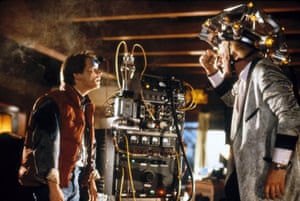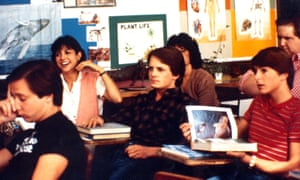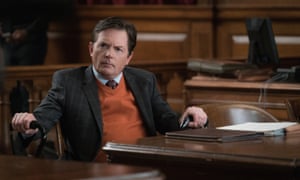This is getting to be me, my Trochanteric Bursitis in my left hip requires me to slow down some while walking and get closer to a full stride. Still impossible since my spasticity will never be cured. So another 40 years of crapola walking.
Michael J Fox: ‘Every step now is a frigging math problem, so I take it slow’
After living with Parkinson’s for 30 years, the actor still counts himself a lucky man. He reflects on what his diagnosis has taught him about hope, acting, family and medical breakthroughs

The last time I spoke to Michael J Fox, in 2013, in his office in New York, he was 90% optimistic and 10% pragmatic. The former I expected; the latter was a shock. Ever since 1998, when Fox went public with his diagnosis of early-onset Parkinson’s disease, he has made optimism his defining public characteristic, because of, rather than despite, his illness. He called his 2002 memoir Lucky Man, and he told interviewers that Parkinson’s is a gift, “albeit one that keeps on taking”.
During our interview, surrounded by the memorabilia (guitars, Golden Globes) he has accrued over the course of his career, he talked about how it had all been for the best. Parkinson’s, he said, had made him quit drinking, which in turn had probably saved his marriage. Being diagnosed at the heartbreakingly young age of 29 had also knocked the ego out of his career ambitions, so he could do smaller things he was proud of – Stuart Little, the TV sitcom Spin City – as opposed to the big 90s comedies, such as Doc Hollywood, that were too often a waste of his talents. To be honest, I didn’t entirely buy his tidy silver linings, but who was I to cast doubt on whatever perspective Fox had developed to make a monstrously unjust situation more bearable? So the sudden dose of pragmatism astonished me. Finding a cure for Parkinson’s, he said, “is not something that I view will happen in my lifetime”. Previously, he had talked about finding “a cure within a decade”. No more. “That’s just the way it goes,” he said quietly. It was like a dark cloud had partly obscured the sun.
Well, seven years is a long time, especially when you have a degenerative disease, and since then, that little cloud turned into a full thunderstorm. In 2018, Fox had surgery to remove a tumour on his spine, unrelated to the Parkinson’s. The aftermath was arduous and dangerous, as tremors and a lack of balance caused by the Parkinson’s threatened the recovery of his fragile spinal cord. One day, at home on his own, after assuring his family he’d be fine without them, he fell over and smashed his upper arm so badly it required 19 screws. Thankfully, he didn’t damage his spine, but the injury plunged him into previously unplumbed despair. “There is no way to put a shine on my circumstance,” he writes in his new memoir, No Time Like The Future: An Optimist Considers Mortality . “Have I oversold optimism as a panacea, commodified hope? In telling other patients, ‘Chin up! It will be OK’, did I look to them to validate my optimism? Is it because I needed to validate it myself? Things don’t always turn out. Sometimes things turn shitty. My optimism is suddenly finite.”
Things being as they currently are, this time Fox and I are meeting by video chat, me in my home in London, him in his office in New York, which looks just as I remember it. “We were here last time, right? I remember,” Fox says, pointing with his chin towards the sofa. Behind him is a photo of him and his wife of 32 years, the actor Tracy Pollan, both of them looking so young, beautiful and in love. There is also a painting of his dog, Gus, who is in his usual place, sleeping at Fox’s feet. Fox himself, still as boyishly handsome as ever, looks much better than I’d feared. He is 59 now, close to the average age for a Parkinson’s diagnosis – except that Fox has already had it for 30 years and is in the advanced stages. As he says, “You don’t die from Parkinson’s, but you do die with it,” and typically the longer you have it, the harder it becomes to carry out basic functions. He can no longer play his beloved guitar, and can’t write or type; this latest book was dictated to Fox’s assistant. He has increasing difficulty in forming words, and occasionally needs a wheelchair. I worried beforehand that talking to me for an hour would be too much, and – less professionally – that I might cry at seeing the physical degeneration of the actor who meant so much to me as a kid.

It soon becomes apparent that both these concerns hugely underestimate Fox. He talks for not just one hour but almost two, and while the tremors, stiffness and occasional word stumbles are more pronounced than when I last saw him, he is very much the funny, thoughtful and engaged man I remember – so much so that within minutes I stop noticing the effects of the Parkinson’s. Here’s a typical exchange: at the time of our interview, the US election is still three weeks away, so we talk about that. “Every worst instinct in mankind has been played on [by Trump], and for me that’s just anathema. Biff is president!” he says, with justified exasperation, given that Back To The Future’s evil bully Biff Tannen was modelled on Trump.
I ask how he felt during the 2016 campaign when Trump mocked the New York Times reporter Serge Kovaleski, who has a disability. “When you see your particular group mocked, it’s such a gut punch. It’s so senseless and cheap. There’s no way I get up in the morning and mock orange people,” he says, and then makes the grin that, for those of us who grew up watching him in the 1980s and 90s, is our Proustian madeleine.
Back in the mid-80s, Fox was one of the biggest stars in the world. He was in the TV sitcom Family Ties, playing the Reaganite son of a pair of hippies, and the lead in the most successful movie of 1985, which was, of course, Back To The Future. It was a meteoric rise for a former army brat who, only a few years earlier, had dropped out of high school in Vancouver to become an actor in Los Angeles. Fox’s parents couldn’t afford a colour TV until the mid-70s, by which point he was already appearing on Canadian TV shows, having taken himself off to auditions as a teenager.
From the start, Fox had terrific screen presence, partly because of his athleticism. As a kid, his small size belied his hockey talents (“It’s a Canadian thing”), and directors quickly spotted his gift for physical comedy: think of when he dances to Surfing USA on top of the van in Teen Wolf, or how he tries to mirror James Woods in the bafflingly underrated 1991 comedy The Hard Way. And most of all, think of the skateboarding, the guitar-playing and all that frantic running in Back To The Future. So for Fox to get an illness that affected his bodily control was an irony that was not lost on him. “I had always liked being an actor that editors would cut to at any time for an appropriate reaction – my character would be animated and engaged. Gradually, with the effects of Parkinson’s, my face began retreating to a passive, almost frozen disposition,” he writes in No Time Like The Future.

But, I tell Fox, I think he’s done some of his best acting since his diagnosis, especially as the slippery lawyer Louis Canning in The Good Wife, who exploits his disability to win his cases; and as the pill-popping paraplegic Dwight on his friend Denis Leary’s show, Rescue Me (he was nominated for three Emmys for The Good Wife, and won for Rescue Me.) “It’s like my walking. I used to walk fast, but every step is now like a frigging math problem, so I take it slow. And with acting, I used to race to the punchline. But I started to really pay attention because I couldn’t just skate over any moment.” Since 2018, he has had to put a pause on the acting. “If something changes, great, or maybe I can figure out how to do it a different way,” he says, but sounding more as if this is for my benefit than an actual expectation.
Fox felt uniquely prepared for lockdown. “All the virtual meetings and keeping 5ft away from people? I do that anyway,” he says. One of the most poignant moments in his book comes when he describes making a surprise visit to his mother on her 90th birthday, and his fear of knocking her over due to his worsening balance. “That is difficult. But Parkinson’s is harder for the people around me than it is on me. The wide variety of movement, from being frozen to careening down the street like a pinball, yeah, that’s hard. But in terms of my feelings about the progress of it, that’s just my situation,” Fox says.
His optimism has, he says, “dimmed or softened” over the years, maybe because of age, maybe because of the inexorable progress of the disease. But one thing that has not changed is his refusal to be self-pitying. “I just don’t see the upside in extracting sympathy from people, or leading with your vulnerability. I need to be understood before I’m helped, because you have to get me before you can get me there,” he says. Pollan, his wife, is not, he says, “all soft-eyed, like, ‘Are you OK?’ She’s like, ‘Are you really wearing that shirt?’”
Because you’re not a patient to her, you’re her husband. “Exactly,” he says, with a relieved grin: I have understood him.
This aversion to self-pity nearly kiboshed the book when coronavirus hit, because, he says, “I couldn’t write about myself and my inner wahhhh when the world is falling apart.” (His publishers disagreed and told him, “Use the time to make your deadline.”) It would have been a real shame if he had junked it, because the book is great: moving but also properly funny (only Fox would take up golf after developing Parkinson’s), and now that he has, to varying degrees, jettisoned the fig leaf of determined optimism, it gives the clearest description of life with Parkinson’s I’ve ever read. Ostensibly, it’s a memoir of his past few years, but Fox describes it more accurately as “an internal travelogue”. “I believe in all the hopeful things I said before,” he says. “But that all seems silly when you’re lying on the floor, waiting for the ambulance because you broke your arm, and you feel like an idiot because you told everyone you’d be fine and you’re not,” he says.
But how could he have known? By dint of having Parkinson’s, Fox has had to become the public’s and his family’s guide to the illness – the world’s highest-profile expert on it, even. But in truth, he’s just figuring it out as he goes along. “Yeah, I’m not playing this on TV,” he laughs. It must have been strange seeing his son – who looks so much like him – go past the age of 29, and to see how obscenely young he was when he was diagnosed, I say.
“Oh yeah, I was a baby. It took me a long time to get my act together and start addressing it,” he says. “It’s such an insidious disease, because when you’re first diagnosed, what you’re presenting is relatively minor. I had a twitching pinky and a sore shoulder. They said, ‘You won’t be able to work in a few years,’ and I’m thinking, ‘From this?’”
When Fox was diagnosed, he had been married for three years and his son, Sam, was a toddler. At first, he couldn’t believe it; then he tried to figure out why. It is believed that a combination of genetic and environmental factors, such as pesticides and pollution, may cause Parkinson’s; Fox later learned that at least four cast members of Leo & Me, a Canadian TV show he starred in as a teenager, also developed early-onset Parkinson’s. “But believe it or not, that’s not enough people to be defined as a cluster, so there hasn’t been much research into that. But it is interesting. I can think of a thousand possible scenarios: I used to go fishing in a river near paper mills and eat the salmon I caught; I’ve been to a lot of farms; I smoked a lot of pot in high school when the government was poisoning the crops. But you can drive yourself crazy trying to figure it out.”
Eventually his symptoms became sufficiently noticeable that he had to quit his sitcom Spin City (for which he won three Golden Globes and an Emmy), and make his diagnosis public. He established the Michael J Fox Foundation, which helped sustain his optimism, and in two decades raised more than $1bn for research. It is one of the most high-profile and effective organisations fighting for a cure.
***
The ultimate source of his motivation is Pollan. The couple met in 1985 on the set of Family Ties, when she guest-starred as his girlfriend. One day on a lunch break, Fox – a rising star and cocky with it – teased her about her garlic breath. Instead of being intimidated, Pollan snapped back: “That was mean and rude and you are a complete and total fucking asshole.” Fox fell in love instantly. She has helped keep him in line ever since, and he says she got him out of his depressive slump in 2018. She is, clearly, a hell of a woman. Four years after Fox’s diagnosis, they had their twin daughters, Schuyler and Aquinnah. After the twins’ fifth birthday – and only two years after he’d had brain surgery to quell the tremors on his left side (it worked, but with Parkinson’s characteristic cruelty, the tremors then moved to his right side) – Pollan told Fox she wanted another baby; their youngest, Esme, was born in 2001. I tell Fox that after my twins’ fifth birthday, I didn’t want another child, I wanted a Valium.
“Ah, it was getting too quiet at home. We knew it needed to be noisier,” he smiles. No Time Like The Future is studded with memories of big family holidays, neither Fox nor Pollan letting the Parkinson’s hold them back. Although that, too, is starting to change: the family trips to the beach have become tricky, as it’s hard for Fox to walk around. But he’s still determined to go on one soon, with Pollan to St Barts: “Sometimes I write cheques I can’t cash, but what the hell,” he shrugs.
Another factor that has helped is the wealth Fox reaped when he was younger, not least from Back To The Future. But he nearly wasn’t in that film at all. Eric Stoltz was originally cast as Marty McFly, until director Robert Zemeckis realised Stoltz didn’t have what was later described as “the screwball energy” Marty needed, and he knew which actor did. Fox has never resented being so defined by one film, but for a long time he was bemused by Back To The Future’s impact. “It’s only recently that I’ve begun to understand it. I showed my son Sam movies from that time which I loved – 48 Hrs, The Jerk – and he didn’t get them. But if you show a kid today Back To The Future, they get it. It’s this thing that’s timeless, which is ironic because it’s about time,” he says.
A large part of that timelessness is down to Fox. His bright-eyed charm and, yes, screwball energy give the film a joyful momentum that makes it an enduring pleasure. For me, it is that rarest of things: a perfect movie, easily up there with The Godfather and Some Like It Hot. But there is one scene that has become more painful to watch as the years have passed. Marty (Fox) is playing guitar at the school dance where his parents, George (Crispin Glover) and Lorraine (Lea Thompson), originally got together, but it looks as if that might not happen now. As George walks away, Marty’s fingers stop working as they should. Then his legs go, and he collapses on to the floor. “I can’t play,” he mutters, shocked. Just then, George kisses Lorraine, and Marty snaps up, as if on springs. He looks with relief at his now functioning hand, and then launches into his performance of Johnny B Goode. But life, as Fox says several times in his book, is not like a movie.

What is the middle ground between optimism and despair? Before talking with Fox, I’d have suggested pragmatism, but that gets dangerously close to despair when you’re having to be pragmatic about a degenerative disease with, as yet, no cure. So Fox found a different path. “When I broke my arm, it was relatively minor, but that was the thing that destroyed me. I thought, what further indignity do I have to suffer? What have I done? Maybe I was wrong to think I couldn’t complain before, maybe optimism doesn’t work,” he says. There were, he says, some dark days spent lying on the sofa, but after a while he got bored. “Then I came to a place of gratitude. Finding something to be grateful for is what it’s about,” he says. Optimism is about the promises of the future, gratitude looks at the present. Fox has retrained his focus from running towards what will be, to seeing what is.
He and Pollan spent lockdown on Long Island with all their children: Sam, 31, Schuyler and Aquinnah, 25, and Esme, 19. “We were always linger-after-dinner people anyway, and now we were lingering and talking about what people were going through. Doing jigsaws, Tracy cooking up a storm, everyone there, these wonderful children and this great wife,” he says. When Fox says “I can’t believe I have this life”, he is not referring to the restrictions of Parkinson’s – he is talking about his happy home.
We have now gone more than 40 minutes over the allotted time, and he repeatedly assures his assistant, who comes in to check, that he wants to keep talking. I tell him that since we last met I’ve interviewed pretty much every major player from Back To The Future.
“How’s Crispin?” he asks, with palpable curiosity about his notoriously eccentric former co-star. Pretty out there, I say, which is an understatement.
“I haven’t spoken to Crispin since the movie, but I always liked him. I remember on the first movie, him and Bob Zemeckis really going at each other about this one scene: Crispin wanted to do it with a broom and Bob didn’t, and oh my God! The indignation! As soon as they moved on and it was safe, I poked my head out of the dressing room, and Chris [Lloyd] poked his head out, and we looked at one another and were like, ‘Thank God that was nothing to do with us!’” he says, bugging his eyes out, Christopher Lloyd-style.
Lloyd is no slouch in the eccentricity department himself. When I interviewed him in 2016, the one time he showed real, non-ironised emotion was when talking about Fox: “What he’s had to deal with, and he just moves ahead with humour and sensitivity. I was watching Back To The Future recently and I thought, ‘Wow, the way he moved… ’”
Marty and Doc’s friendship feels so real on screen that it has been homaged endlessly, including the cartoon Rick And Morty. Were they close when they made the film? “We were both so focused on what we were doing, and I was also making Family Ties at the same time, so we didn’t really hang out. But we became close after the movies, and now we’re really tight,” Fox says.
By this point, I let my guard down so much that, to my horror, I hear myself telling Fox that, whenever anyone asks me who my favourite interviewee is, in my two decades of talking to celebrities, I always say him. I also burble that interviewing him in 2013 for ever changed my perspective of chronic illness and what constitutes a life well lived. He smiles the smile of a man who is used to hyperbolic compliments from strangers, but does not doubt their authenticity.
“This will sound strange, but Eddie Van Halen passed away the other day, and he had a cameo in Back To The Future,” he says. (Van Halen played the music that Marty plays to George, to convince him he’s being visited by an alien.) “My kids found a picture of me from 1983 with Eddie Van Halen, where I look 12, and he looks 14, and I thought, ‘What a cool life I’ve lived, where my kids can find a picture of me with Van Halen on the internet.’ It’s like looking back on footprints in the sand. Look where I’ve been.”

Does he ever watch his old movies? “I don’t. I might watch for a few minutes, then I change the channel. It’s just… ” he trails off. He changes the subject to Muhammad Ali, who was diagnosed with Parkinson’s in his early 40s and died in 2016. “I wondered what he thought when he saw old footage of himself, so I asked his wife, Lonnie, if it made him sad. She said, ‘Are you kidding? He loves it! He’d watch it all day if he could.’ For him, any feelings of loss or wistfulness were overtaken by the celebration that it existed: it’s a fact, it’s evidence and it’s preserved.”
His children, he says, don’t really watch his movies. When his daughters were younger and read magazines about One Direction, he would say, “Thirty years ago, that was me!” What did they do? “They would roll their eyes. But my son, Sam, he gets it. He knows all about filmmakers and films, so he really understands my career.”
Maybe that’s a way for him to get to know you in the past, I say. Like Marty meeting a young George. “Yeah, maybe. I think he appreciates it. But I never wanted my kids to know me as anything other than their dad.”
His assistant comes in to ask him about lunch. He says he’s happy to keep talking, but I say I’d feel bad if I kept him from going out for lunch with his wife. “OK, it was nice to see you. I’ll write another book just to do this again,” he says, cheerfully.
Before he goes, I sneak in another question: given that he uses the word in his book’s title, how does he feel about the future now? “I don’t make a lot of plans. I’m a little – I sometimes wonder how… ” he trails off again. Until so recently, he maintained momentum: travelling, golfing with his friends, determinedly moving forward. How is he finding staying still? “Some of those changes are hard. But as limited as I am in some regards, if you’d told me when I was diagnosed that I’d have this life now and do the things that I do, I’d have said, ‘I’ll take it.’ I can move around – it takes some planning, but I can move. I can think, I can communicate and I can express affection. What else do you want?”

No comments:
Post a Comment